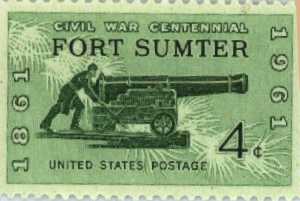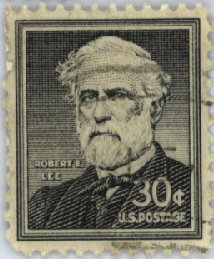FRtR > Outlines > American History (1990) > Chapter Five > Civil War begins (7/12)
An Outline of American History (1990)
Chapter Five
Civil War begins (7/12)
< Previous Page * Next Page >
 Less than a month later, on March 4, 1861, Abraham
Lincoln was sworn in as President of the United States. In his
inaugural address, he refused to recognize the secession, considering it
"legally void." His speech closed with a plea for restoration of
the bonds of union. But the south turned deaf ears, and on April
12, guns opened fire on Fort Sumter
in the Charleston, South
Carolina, harbor. All hesitation was now swept from the minds
of the northerners.
Less than a month later, on March 4, 1861, Abraham
Lincoln was sworn in as President of the United States. In his
inaugural address, he refused to recognize the secession, considering it
"legally void." His speech closed with a plea for restoration of
the bonds of union. But the south turned deaf ears, and on April
12, guns opened fire on Fort Sumter
in the Charleston, South
Carolina, harbor. All hesitation was now swept from the minds
of the northerners.
In the seven states that had seceded, the people responded
promptly to the appeal of their President, Jefferson
Davis
.
The action of the slave states that thus far had remained loyal was
now tensely awaited by both sides. Virginia took the fateful step
on April 17, and Arkansas and North Carolina followed quickly.
No state left the Union with greater reluctance than Virginia.
Her statesmen had had a leading part in the winning of the
Revolution and the framing of the Constitution, and she had provided
the nation with five Presidents. With Virginia went Colonel
Robert E. Lee, who declined the command of the Union army
out of loyalty to his state. Between the enlarged Confederacy and
the free-soil north lay the border states, which, proving
unexpectedly nationalist in spirit, kept their bonds with the Union.
who declined the command of the Union army
out of loyalty to his state. Between the enlarged Confederacy and
the free-soil north lay the border states, which, proving
unexpectedly nationalist in spirit, kept their bonds with the Union.
The people of each section entered the war with high hopes
for an early victory. In material resources the north enjoyed a
decided advantage. Twenty-three states with a population of 22
million were arrayed against 11 inhabited by 9 million. The
industrial superiority of the north exceeded even its preponderance
in manpower, providing it with abundant facilities for
manufacturing arms and ammunition, clothing, and other supplies.
Similarly, the network of railways in the north contributed to
federal military prospects.
< Previous Page * Next Page >
 Less than a month later, on March 4, 1861, Abraham
Lincoln was sworn in as President of the United States. In his
inaugural address, he refused to recognize the secession, considering it
"legally void." His speech closed with a plea for restoration of
the bonds of union. But the south turned deaf ears, and on April
12, guns opened fire on Fort Sumter
in the Charleston, South
Carolina, harbor. All hesitation was now swept from the minds
of the northerners.
Less than a month later, on March 4, 1861, Abraham
Lincoln was sworn in as President of the United States. In his
inaugural address, he refused to recognize the secession, considering it
"legally void." His speech closed with a plea for restoration of
the bonds of union. But the south turned deaf ears, and on April
12, guns opened fire on Fort Sumter
in the Charleston, South
Carolina, harbor. All hesitation was now swept from the minds
of the northerners.
 who declined the command of the Union army
out of loyalty to his state. Between the enlarged Confederacy and
the free-soil north lay the border states, which, proving
unexpectedly nationalist in spirit, kept their bonds with the Union.
who declined the command of the Union army
out of loyalty to his state. Between the enlarged Confederacy and
the free-soil north lay the border states, which, proving
unexpectedly nationalist in spirit, kept their bonds with the Union.